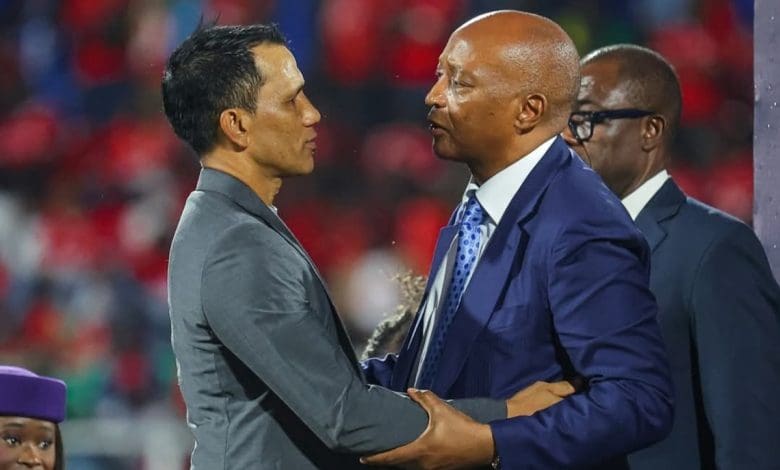In what was billed as a showcase of footballing intellect and elite-level talent, Bradley Carnell’s masterclass in tactical discipline and execution brought Lionel Messi and Inter Miami crashing back to reality, while Edgar Davids’ Simba SC fell apart under the weight of expectation. It was a night that delivered drama, heartbreak, and an emphatic reminder that names don’t win matches—tactics, cohesion, and hunger do.
This was not supposed to happen—not like this. The glitz and glamour surrounding Inter Miami, spearheaded by global icon Lionel Messi, had made them favorites on paper and in the minds of most observers. The Argentine maestro, flanked by former Barcelona teammates Sergio Busquets and Jordi Alba, had transformed Miami’s style of play since arriving in Major League Soccer, lifting them from mediocrity to must-watch entertainment. Under normal circumstances, a showdown with Simba SC, a team based in Tanzania and led by Dutch legend Edgar Davids, would seem like a formality. But these weren’t normal circumstances.
What unfolded was anything but ordinary. Bradley Carnell, the South African tactician known for his organizational brilliance and counter-attacking philosophy, marshaled a side that pressed with intensity, defended with unity, and attacked with purpose. His team, a ragtag group of underappreciated grinders and emerging talents, wasn’t intimidated by Messi’s presence. They respected him—but didn’t fear him. That approach proved decisive.
From the opening whistle, Carnell’s side was locked in. Their pressing forced Inter Miami into rushed passes and uncharacteristic errors. While Messi dropped deep to dictate play, he was shadowed persistently by a rotating trio of midfielders who gave him no room to breathe. Carnell’s decision to double-mark Messi with overlapping midfield screens neutralized his creativity. Alba’s runs were tracked with robotic precision, and Busquets, often the heartbeat of Miami’s build-up play, found himself isolated and outnumbered. The system was tight. The gaps were closed. Inter Miami was suffocating.
Meanwhile, Simba SC had problems of their own. Edgar Davids, once one of the most feared midfielders in world football, found his side undone by their own disorganization. Despite a few bright moments, Simba’s performance was riddled with inconsistency. Davids had opted for an expansive, possession-heavy approach, perhaps hoping to outplay his opposition with flair and freedom. But freedom without structure is chaos. Simba’s backline crumbled under minimal pressure, conceding two soft goals that stemmed directly from lapses in communication.
Carnell’s fingerprints were all over the match. His team executed their game plan flawlessly, springing into action with devastating speed every time they won possession. The first goal came midway through the first half, when a turnover in midfield led to a blistering counterattack that left Miami’s defense exposed. A low cross whipped in from the right found its way to the edge of the box, where a surging run was met with a one-touch finish that rattled the top corner. Miami’s goalkeeper barely moved. The second came just after halftime—another fast break, another incisive ball through the lines, and another clinical finish.
While Messi tried to rally his team, orchestrating every possible forward move, it was clear he was waging a lone war. His teammates weren’t on the same wavelength. The defensive line was sluggish in transition, and the midfield lacked the bite needed to win 50-50 challenges. Carnell had exposed Miami’s soft underbelly: their tendency to overcommit and their vulnerability in defensive transitions.
Simba SC, watching from the sidelines, couldn’t capitalize. Despite their technical ability, their lack of organization betrayed them. Davids cut a frustrated figure on the touchline—animated, shouting instructions, trying to will his side into shape. But it was too late. The opposition exploited Simba’s high line with ruthless efficiency, adding a third goal that sealed the result and left Davids’ side reeling.
The contrast between Carnell and Davids was stark. One was calm, composed, and calculated. The other, impassioned but increasingly desperate. Carnell made the right adjustments at the right time, rotating his midfield to ensure Messi never saw the same marker twice in succession. He instructed his full-backs to remain conservative until it was time to overload the flanks in possession. His substitutions were timely and purposeful. Every move was deliberate.
Davids, meanwhile, seemed caught between philosophies—wanting to play a high-risk, high-reward style without the foundation necessary to sustain it. His substitutions offered no tactical advantage, and his players looked unsure of their roles. There was a glaring disconnect between his vision and its execution on the pitch.
But while the result was a tactical victory for Carnell and a sobering reality check for Davids, it was also a broader statement about modern football. The game is evolving. It no longer bows purely to individual brilliance. Messi, the greatest player of his generation and perhaps all time, found himself muted by a well-drilled system that valued structure over spectacle. And that’s where Carnell’s brilliance shone through—not in denying Messi the ball, but in denying him space, denying him rhythm, and ultimately denying him relevance.



